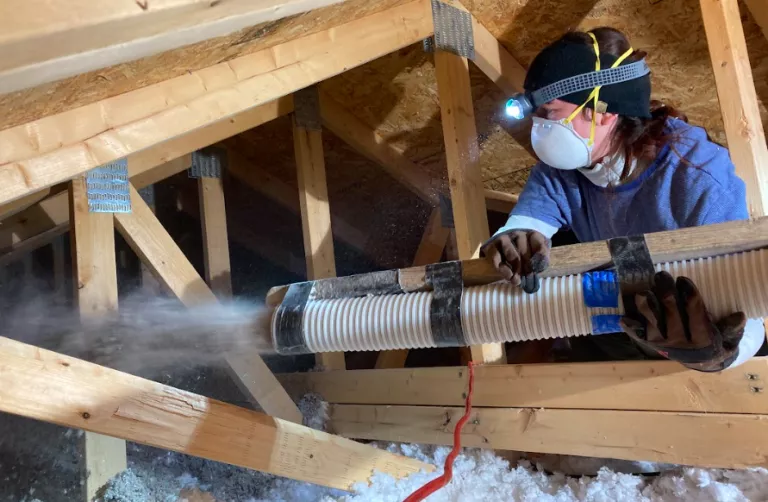By David Gibson, Sierra Club Maine Executive Committee Member, Director of Energy at College of the Atlantic, and Building Performance Association Member

COA student Celia Morton insulates an attic, photo by David Gibson
Maine has set ambitious climate goals, including the goal for 100% clean electricity by 2040. To truly achieve 100% clean energy statewide, we need to transition every single one of the 746,000 homes and 147,000 small businesses across the state entirely off of fossil fuels. The critical first step is properly air sealing and insulating the building envelope to reduce heat loss. Doing so reduces energy use, and carbon emissions, by 30-50%, or more for particularly old and inefficient ones.
In the last 5 years, the Weatherization Assistance Program has insulated 1,537 homes, or ~307 each year, and in 2022 Efficiency Maine rebated 3,446 building envelope measures. Combined, these programs are helping insulate less than 4,000 homes each year, and neither program offers incentives for insulating small businesses. At current rates, it will take more than 200 years to seal and insulate all the buildings in Maine. This is woefully inadequate.
The biggest barrier to improving the rate of efficiency improvements is a workforce shortage. To seal and insulate all our buildings in the next 20 years, we need ~10 times the number of workers in the insulation and building performance industry. These jobs are tough, crawling in dirty crawlspaces and air sealing in hot attics, but they cannot be outsourced to another country. Every day is rewarding, helping make someone’s home more comfortable, healthier and cost less to operate. These jobs are reasonably well-paid, with starting rates over $20/hour. There is funding for training new workers, so there is no degree requirement or cost barrier to get into the industry. If you or someone you know is interested in working in Maine’s energy efficiency sector, please sign up here to learn about job and training opportunities.
With your help, we can seal and insulate all Maine buildings. This will significantly reduce fossil fuel consumption and allow for the next steps in electrifying our buildings and completing the state’s clean energy transition.
David Gibson serves on the Sierra Club Maine Executive Committee. He is the Director of Energy at College of the Atlantic, and a member of the Building Performance Association.